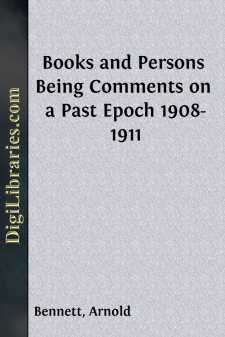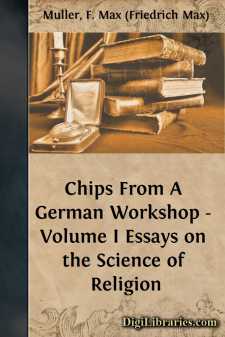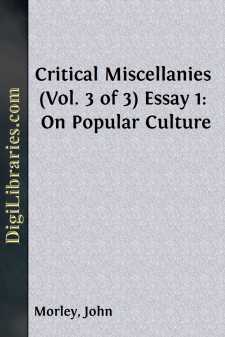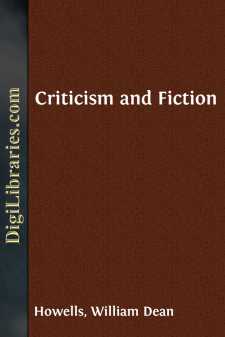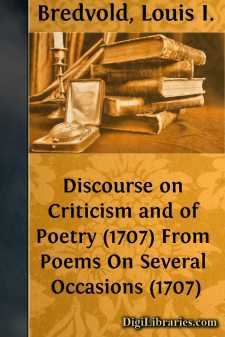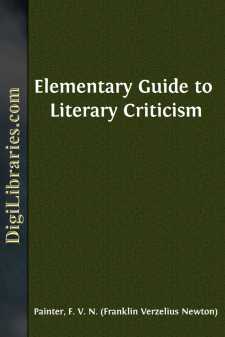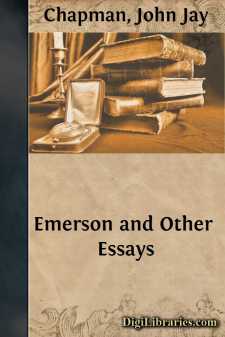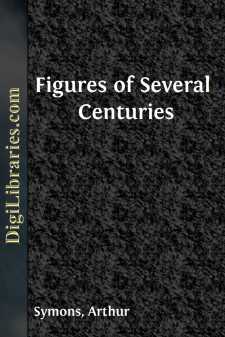Literary Criticism
- American 18
- Ancient and Classical 3
- Asian 1
- Australian & Oceanian 1
- Books & Reading 8
- Caribbean & Latin American 2
- Drama 2
- English, Irish, Scottish, Welsh 49
- European 7
- General
- Horror 1
- Humor 2
- Jewish 2
- Medieval 2
- Middle Eastern 3
- Poetry 7
- Renaissance 6
- Russian & Former Soviet Union 1
- Shakespeare 27
General Books
Sort by:
by:
Arnold Bennett
WILFRED WHITTEN'S PROSE 4 Apr. '08 An important book on an important town is to be issued by Messrs. Methuen. The town is London, and the author Mr. Wilfred Whitten, known to journalism as John o' London. Considering that he comes from Newcastle-on-Tyne (or thereabouts), his pseudonym seems to stretch a point. However, Mr. Whitten is now acknowledged as one of the foremost experts in...
more...
PREFACE. ore than twenty years have passed since my revered friend Bunsen called me one day into his library at Carlton House Terrace, and announced to me with beaming eyes that the publication of the Rig-veda was secure. He had spent many days in seeing the Directors of the East-India Company, and explaining to them the importance of this work, and the necessity of having it published in England. At...
more...
by:
John Morley
The proceedings which have now been brought satisfactorily to an end are of a kind which nobody who has sensibility as well as sense can take a part in without some emotion. An illustrious French philosopher who happened to be an examiner of candidates for admission to the Polytechnic School, once confessed that, when a youth came before him eager to do his best, competently taught, and of an apt...
more...
The question of a final criterion for the appreciation of art is one that perpetually recurs to those interested in any sort of aesthetic endeavor. Mr. John Addington Symonds, in a chapter of 'The Renaissance in Italy' treating of the Bolognese school of painting, which once had so great cry, and was vaunted the supreme exemplar of the grand style, but which he now believes fallen into...
more...
Introduction What little is known of the life of Samuel Cobb (1675-1713) may be found in the brief article in the Dictionary of National Biography by W.P. Courtney. He was born in London, and educated at Christ's Hospital and at Trinity College, Cambridge, where he obtained the degrees of B.A., 1698, and M.A., 1702. He was appointed "under grammar master" at Christ's Hospital in 1702...
more...
CHAPTER I NATURE AND OFFICE OF CRITICISM 1. Purpose of Literary Study. The study or reading of literature ordinarily has a threefold purpose,—knowledge, pleasure, and culture. This purpose shows us both the character of the literature which should be read and the manner in which it should be read. As a rule we should read only books of recognized excellence, and read them with sympathetic...
more...
by:
John Jay Chapman
EMERSON I "Leave this hypocritical prating about the masses. Masses are rude, lame, unmade, pernicious in their demands and influence, and need not to be flattered, but to be schooled. I wish not to concede anything to them, but to tame, drill, divide, and break them up, and draw individuals out of them. The worst of charity is that the lives you are asked to preserve are not worth preserving....
more...
by:
Arthur Symons
SAINT AUGUSTINE The Confessions of St. Augustine are the first autobiography, and they have this to distinguish them from all other autobiographies, that they are addressed directly to God. Rousseau's unburdening of himself is the last, most effectual manifestation of that nervous, defiant consciousness of other people which haunted him all his life. He felt that all the men and women whom he...
more...
by:
Julius West
INTRODUCTORYThehabit, to which we are so much addicted, of writing books about other people who have written books, will probably be a source of intense discomfort to its practitioners in the twenty-first century. Like the rest of their kind, they will pin their ambition to the possibility of indulging in epigram at the expense of their contemporaries. In order to lead up to the achievement of this...
more...
The Problem of a Preface A peculiar difficulty arrests the writer of this rough study at the very start. Many people know Mr. Bernard Shaw chiefly as a man who would write a very long preface even to a very short play. And there is truth in the idea; he is indeed a very prefatory sort of person. He always gives the explanation before the incident; but so, for the matter of that, does the Gospel of St....
more...


